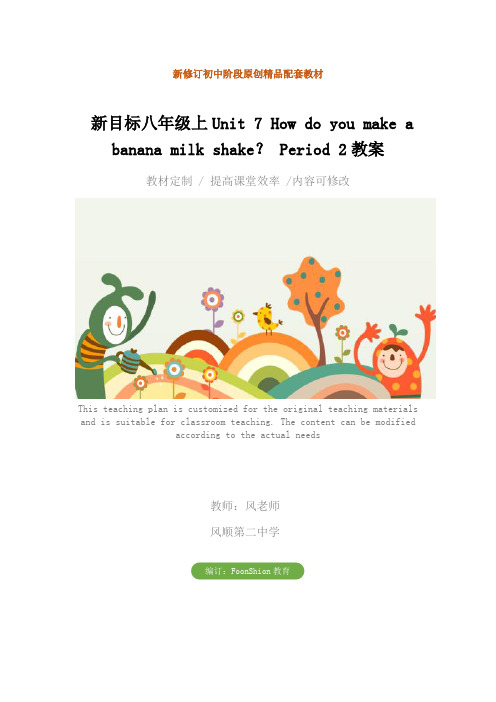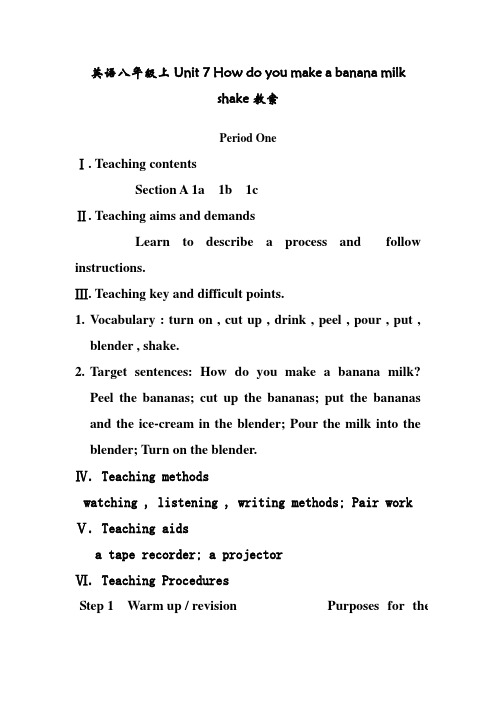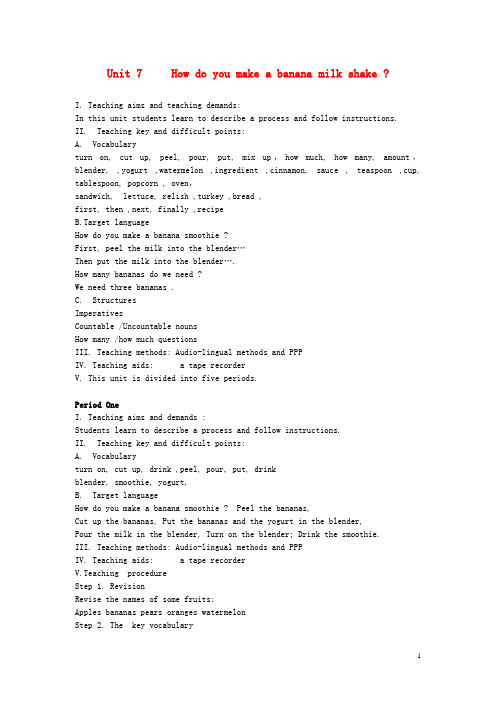八年级英语上unit7howdoyoumakebananamilkshake
- 格式:ppt
- 大小:3.99 MB
- 文档页数:53

新修订初中阶段原创精品配套教材新目标八年级上Unit 7 How do you make a banana milk shake? Period 2教案教材定制 / 提高课堂效率 /内容可修改This teaching plan is customized for the original teaching materials and is suitable for classroom teaching. The content can be modifiedaccording to the actual needs教师:风老师风顺第二中学编订:FoonShion教育新目标八年级上Unit 7 How do you make a banana milk shake?Period 2教案新目标八年级上unit 7 how do you make a banana milk shake? period 2教案一.教材依据人民教育出版社新目标英语八年级上第七单元“how do you make a banana milk shake?”二.教学目标语言目标ingredients;amount; recipe;put…in; pour into;turn on /off; cut up ; mix up; peel; foldfirst; then; next; finally学会正确使用可数名词与不可数名词;学会在谈论食物制作过程中使用how much…? how many…?能力目标了解西方饮食习俗与文化;学会介绍某样食物的制作过程;运用所学语言,实现能力迁移,介绍其他事物的制作过程或使用程序;跨学科学习美术:制作请柬;艺术:在圣诞晚会上准备表演一个拿手的节目电脑信息:教人如何上网;社会实践:为孤儿院的小朋友开西式自助餐圣诞晚会三.语言结构:祈使句的运用;使用描述事物发生先后顺序的词语,如:first,next,then,finally;可数与不可数名词的计量。

英语八年级上Unit 7 How do you make a banana milkshake教案Period OneⅠ. Teaching contentsSection A 1a 1b 1cⅡ. Teaching aims and demandsLearn to describe a process and follow instructions.Ⅲ. Teaching key and difficult points.1.Vocabulary : turn on , cut up , drink , peel , pour , put ,blender , shake.2.Target sentences: How do you make a banana milk?Peel the bananas; cut up the bananas; put the bananas and the ice-cream in the blender; Pour the milk into the blender; Turn on the blender.Ⅳ. Teaching methodswatching , listening , writing methods; Pair work Ⅴ. Teaching aidsa tape recorder; a projectorⅥ. Teaching ProceduresStep 1 Warm up / revision Purposes for the1. Enjoy a movie and relax2. Revise the names of some food.Like: vegetables , meat , fruits, drinks.Step 2. The key vocabulary1. Discuss where people usually have meals and where the foods are from.(home-cooing , take-away food)2. Discuss what food people make . (Some people like to cool body by making food at home, especially in summer. The weather is too hot. So people make some food to cool body.) ·banana milk shake·fruit salad(Possible :popcorn , sandwiches , pancake) designs观看有关食物的电影片断,调动情感,营造氛围。

八上英语7单元笔记
以下是八年级上册英语第七单元的笔记:
Unit 7 ~How do you make a banana milk shake? "
1.制作过程
(1)先拿一个香蕉,把皮剥掉。
并将香蕉切成小块。
(2) 拿出一杯酸奶,把香蕉块放进去。
(3)加入适量的蜂蜜,搅拌一下。
(4) 最后,把饮料倒入杯子里,即可享用。
2.制作方法
(1)把香蕉切成小块,放入搅拌机中。
(2)加入适量的牛奶和蜂蜜。
(3)搅拌均匀后,倒入杯子里即可。
3.制怍步骤
(1)把一个苹果洗净,去核后切成小块。
(2)把两杯酸奶倒入碗中。
(3)加入适量的蜂蜜和柠横汁。
(4) 最后,把苹果块和燕麦片放入碗中,即可享用。
4.制作方法
(1) 把一个橙子剥皮后切成小块。
(2)把两杯鲜榨果汁倒入杯中。
(3)加入适量的蜂蜜和柠檬汁。
(4)最后,把橙子块放入杯中即可。
5.制怍步骤
(1)把两个鸡蛋打入碗中。
(2) 加入适量的牛奶和糖。
(3)搅拌均匀后,倒入锅中煮至凝固即可。
(4)最后,把煎好的蛋饼卷起来即可享用。

Unit7 How do you make a banana milk shake?The first period说课稿一、说教材(一)教学内容分析:本课是《义务教育课程标准实验教科书·英语》八年级上册第七单元How do you make a banana milk shake?第一课时。
本单元中心话题是学习询问和描述一种食物的制作过程,本课时学习“询问和描述香蕉奶昔的制作过程”。
(二)教学目标:1.知识与能力:1).语言知识目标:通过学习使学生掌握并能熟练运用制作香蕉奶昔的词语和句型。
Words: blender,milk shake,peel,pour,cut up,turn on,put,drinkSentences: How do you make a banana milk shake?Peel threee bananasCut up the bananas.Put the bananas and ice cream into the blender.Pour the milk into the blender.Turn on the blender. Drink the milk shake.2).语言技能目标:能运用所学词汇句型描述奶昔的制作过程,能在真实情景中熟练运用。
2.过程与方法:通过预习,听,说,读,写等活动,熟练应用所学单词和动词词组,掌握香蕉奶昔的制作过程.。
3.情感态度与价值观:通过创设情景,学生身临其境感受和体验,使语言学以致用,激发学生的学习积极性。
体会在活动中学习英语的乐趣。
培养学生乐于与他人合作的精神,并与他人分享成功的喜悦.为父母做力所能及的事。
4.文化意识目标:了解西方人的饮食文化。
5.学习策略目标:通过学习,使学生在一定程度上形成自主学习、探究学习、合作学习的习惯,有效交际、用英语思维的能力。
(三)、依据新课程标准及本单元总目标我确定本课的教学重点为:重点:学习制作奶昔所需的相关词汇和句型。


Unit 7 How do you make a banana milk shake ?I. Teaching aims and teaching demands:In this unit students learn to describe a process and follow instructions.II. Teaching key and difficult points:A. Vocabularyturn on, cut up, peel, pour, put, mix up,how much, how many, amount,blender, ,yogurt ,watermelon ,ingredient ,cinnamon, sauce , teaspoon ,cup, tablespoon, popcorn , oven,sandwich, lettuce, relish ,turkey ,bread ,first, then ,next, finally ,recipeB.Target languageHow do you make a banana smoothie ?First, peel the milk into the blender…Then put the milk into the blender….How many bananas do we need ?We need three bananas .C. StructuresImperativesCountable /Uncountable nounsHow many /how much questionsIII. Teaching methods: Audio-lingual methods and PPPIV. Teaching aids: a tape recorderV. This unit is divided into five periods.Period OneI. Teaching aims and demands :Students learn to describe a process and follow instructions.II. Teaching key and difficult points:A. Vocabularyturn on, cut up, drink ,peel, pour, put, drinkblender, smoothie, yogurt,B. Target languageHow do you make a banana smoothie ? Peel the bananas,Cut up the bananas, Put the bananas and the yogurt in the blender,Pour the milk in the blender, Turn on the blender; Drink the smoothie.III. Teaching methods: Audio-lingual methods and PPPIV. Teaching aids: a tape recorderV.Teaching procedureStep 1. RevisionRevise the names of some fruits:Apples bananas pears oranges watermelonStep 2. The key vocabularyIntroduce the new vocabulary and give the students a clear picture of the process that is described in this by using the pictures in the unit.Task 1. Teach the names of all items.Point to the pictures of the items and ask students to repeat .Task 2. Focus on the pictures. Ask the students to tell what they see in the picture.Describe each action and ask students to repeat the following :Peel the bananas, Cut up the bananas, Put the bananas and the yogurt in the blender, Pour the milk in the blender, Turn on the blender; Drink the smoothie.Task 3. Ask the students to write the names of the actions on the blank lines. Then check the answersStep 3. ListeningTask 1. Point to the actions in the picture and the list of actions in activity 1b. Ask different students to look at the picture and tell what is happening .Ask others to read the list of actions in activity 1b.Task 2. Play the recording for the first time .The students only listen. Then listen to the conversation. Number the instructions.Ask students to complete the activity on their own. Then correct the answers. Step 4. Practice using the target language.Task 1. Read the instructions in the correct order.Task 2. How do you make a banana smoothie ?Task 3. Pairwork. Ask the students to start their conversations like the sample conversation.As they talk, move around the room monitoring their work .Task 4. Ask one or two students to say the list of instructions to the class without looking at the book.Homework1. review the words .2. describe a process .Period TwoI. Teaching aims and demands :Students learn to describe a process and follow instructions by guided listening and writing practice .II. Teaching key and difficult points:A. Vocabularycinnamon ,yogurt ,teaspoon , ingredient, turn on, cut up, drink ,peel, pour, put, drinkblender, smoothie, yogurt, how much ,how many one teaspoon of cinnamonB. Target languageHow do you make a banana smoothie ? Peel the bananas, Cut up the bananas,Put the bananas and the yogurt in the blender,Pour the milk in the blender, Turn on the blender; Drink the smoothie.How much yogurt do you need ? How many apples do we need ?III. Teaching methods: Audio-lingual methods and PPPIV. Teaching aids: a tape recorderV.Teaching procedureStep 1. RevisionRevise how to describe a process .Step 2. VocabularyIntroduce the new vocabulary using the picture in 2a .Ask the students to read and repeat the words .Step 3. Listening and writingTask 1 Point out the two columns in the chart and read the headings, How much and how many .Play the recording for the first time .Students only listen. Listen again and fill in the chart. Check the answers.Task 2 Point to the chart and ask a student to read the amounts in the first column .Point to the measuring cup and a teaspoon in the picture above.Focus on the headings at the top of each column.Ask the students to say what these words mean using their own words.Task 3 Listen to the recording again and write words in the correct spaces in the ingredient column. Then check the answers.How many bananas do we need ?Three.( Countable nouns )How much yogurt do we need ? One cup .( Uncountable )Step 4.PairworkTask 1 Ask two students to read the conversation to the class.Task 2 Have the students work in pairs.Task 3. Check the answers by asking different pairs to do one question and answer each .Step 5. Grammar FocusReview the grammar box .Ask students to say the questions and answers.Pay attention to Uncountable nouns and Countable nouns. How many , How much .Step 6.Homework1. Revise the directions for making a banana smoothie in activity 1b.2. Make a conversation on how to make a fruit salad.Period ThreeI. Teaching aims and demands :Students learn to describe a process and follow instructions by reading and writing . II. Teaching key and difficult points:A .Vocabularyfirst , next , then , finally mix up , cut up , put…in/ into ,turn on pepper , popcorn popper ,sauce , ovenB .Target languageHow do you make fruit salad ?First cut up…. Next put …in …. Then…. Finally mix it all up .III. Teaching methods: Audio-lingual methods and PPPIV. Teaching aids: a tape recorderV.Teaching procedureStep 1. Revision1. Dictation.2. Check the homework. Act out the conversations.Step 2. Speaking and readingTask 1.Point to the picture and ask students what they are doing .Revise to describe the process.Task 2.Read the short passage and fill in the blanks with the words .First ,…next….then…..finally ….Task 3. Tead the description.Step 3.PairworkTask 1 . Look at the instructions in 3a again.Task 2. Look at the pictures and tell your partner how to make popcorn.First, put the popcorn into the popper. Next , turn on the popper.Next, pour the popcorn into the bowl. Then, put salt on the popcorn.Finally, eat the popcorn.Show the instructions to the students and read them loudly.Step 4. Game Recipe gameMake two teams . Write a recipe. Then cut it up. The other team has to put the recipe in order.Pay attention to these words: sauce crust pepper cheesePizza in the ovenHomework1. review the words .2. describe a process .3. copy and recite the instruction in 3a.Period FourI. Teaching aims and demands :Students learn to describe a process and follow instructions.II. Teaching key and difficult points:A .VocabularyAdd, bread , slice , mayonnaise , turkey , relish , meat , mushroom, other, sandwich , tomato sauce , mustardB. Target languageHow many tomatoes? How much mayonnaise?First, next, then, finally .III. Teaching methods: Audio-lingual methods and PPPIV. Teaching aids: a tape recorderV.Teaching procedureStep 1. Revision1.Dictation.2.Check the homework.Step 2. Reading and writing practice using the target language.Task 1.Key vocabulary : mayonnaise, relish , lettuce , turkey slices, sandwich, onion, tomato, say each word and ask students to repeat it.Task 2.Say , What things do you like in a sandwich ? Step 3. PairworkStusents take turns asking your partner what he or she likes in sandwiches.Step 4. ListeningTask 1.Listen and circle the words you hear.Task 2. Listen again and write the ingredients in the order you hear them .Then check the answers.Step 5. PairworkThis activity provides guided oral practice using the target language.Task 1.Ask students to take a few minutes to write down the things they use to make their favourite sandwiches.Task 2. Work in pairs .Task 3. Ask several pairs to say their conversations to the class.Homework1 review the words .2 describe a process of making a favorite sandwich .Period FiveI. Teaching aims and demands :Students learn to describe a process and follow instructions by reading and writing a recipe .II. Teaching key and difficult points:A.Vocabulary mayonnaise , a slice of , add , lettuce , relish , top, mustardB .Target language Describe a process.III. Teaching methods: Audio-lingual methods and control-reading and writing. IV. Teaching aids: a tape recorderV.Teaching procedureStep 1. Revision1. Dictation .2. Check the homework .Step 2. Read the recipe and write the ingredients in the chart below.Task 1. Read the recipe .Task 2. Fill in the chart .Step 3. Reading and fill in the recipe with the words from the box .Step 4. Write a recipe for your favorite sandwich or another favorite food.Step 5. SelfcheckTask 1.Fill the blanks with the words given .Task 2. Write instructions for the correct way to eat Beijing Duck .HomeworkReview the words . finish off the recipe.Period SixI. Teaching aims and demands :Students learn to describe a process and follow instructions.II. Teaching key and difficult points:Vocabulary Target languageIII. Teaching methods: Audio-lingual methods and PPPIV. Teaching aids: a tape recorder V.Teaching procedureRevision课后反思。
Unit 7 How do you make a banana milk shake? I.Teaching objectives 单元教学目标II. Teaching materials analyzing and rearranging 教材分析和教材重组1. 教材分析本单元的中心话题是Cooking at home,主要围绕How do you make a banana milk shake?这一主题展开各种教学活动。
并以这一主题引出可数名词和不可数名词,how many/how much 问句及祈使句等语言功能。
本单元旨在让学生学会描述制作某个东西的过程和步骤,进而分析中西方在饮食文化方面的不同,通过听、说、读、写来培养学生综合运用这些知识的能力。
最终让学生能在“做中学”(learning by doing),通过有限的课堂实践活动,能准确地用英语来表达。
Section A 1a介绍本单元的重点词汇:一些用以描述香蕉饮料的制作过程的动词,并让学生根据图片选择正确的动词完成图中句子,由此引入本单元的主题;1b让学生听一段对话录音,根据听到的顺序给句子排序,帮助学生从听力材料中了解、获取目标语言;1c是一个口头会话练习(结对子活动),指导学生如何用目标语言进行对话(描述香蕉饮料的制作过程);2a和2b是两个听力活动,通过听力训练帮助学生进一步了解目标语言的用法,落实听与写的技能目标;2c 是结对子口语会话活动,从描述如何制作香蕉饮料扩展到如何制作水果色拉,以巩固目标语言,是对学生的一种语言输出练习;3a要求学生阅读对话,并用所给的词完成对话,掌握几个表顺序的副词的用法;3b要求学生根据3a中的对话示范,看图向同伴描述爆米花的制作过程,帮助学生进一步用目标语言进行口头表达;4 是一个写食谱、拼食谱的游戏活动,给学生提供了一个学以致用的机会,是学生运用目标语言进行听、说、读、写的综合训练。
Section B 1a让学生写出自己喜欢的三明治配料并与其他学生比较,学习一些表食品的词汇,为后面的课堂活动作铺垫;1b是在1a基础上的口头训练,仿照对话与同伴谈论喜欢的三明治配料;2a和2b是两个听力练习,其中2b也有写的训练;2c又是一个结对子口头会话练习,要求学生描述自己最喜欢的三明治的制作过程,是对目标语言的巩固与扩展;3a、3b和3c为读、写训练,通过一系列活动了解中西方饮食文化的差异,其中3a是一篇关于Recipe的阅读材料,要求学生根据材料内容写出“Super Chicken Sandwich”的配料并进行分类完成表格,是一项巩固词汇的读写训练;3b是在3a的基础上的读与写的训练,完成A recipe for Sandwich的阅读语言材料;3c用目标语言进行写作的训练,落实与巩固写的技能;4是一项口语训练活动,体现了英语语言“在做中学,在学中用”的特点,本单元的综合语言知识能力的运用在此体现出来。
八年级上学期英语词语解释( Unit7SectionA.B ) 1.shake n ( 牛奶和冰淇淋摇匀制成的)混合饮料milk shake 奶昔make a banana milk shake 做香蕉奶昔(1)How do you make a banana milk shake?你如何做香蕉奶昔?(2)Could you tell me how to make an orange milkshake? 请问如何做桔子奶昔?shake v –shook * shake one’s hand with sb.和某人握手(3)His father shook his hand with the headmaster.yesterday. 昨天他父亲和校长握了手。
2.blender 果汁机,搅拌机turn on the blenderturn off the blender(1)Turn on the blender to make orange juice.打开搅拌机做桔子汁。
(2)Please turn off the blender after you finish making apple juice.你做完苹果汁后请关闭搅拌机。
3.cut –cutting –cut 切,割,砍cut ……into……cut up 切碎(代词做宾语放在中间)(1)C ut them up before you put them into the blender.你把他们放入撑伴机前把他们切碎。
(2)-What should we do next, Mum?-Here are some bananas. We have to cut them up.妈妈接着我们该做什么?这有一些香蕉。
我们得把他们切碎。
(3)W e use one of the two knives to cut up the beef.我们用其中的一把刀来切牛肉。
Unit 7 How do you make a banana milk shake1.Turn on the blender.1)turn on打开(电器等)反义词:turn off关上(电器等)。
2)关于turn的词组:turn up(音量调大,调高)turn down(把音量调小,调低)turn in上交 turn into使成为,翻译成 turn to转向3)辨析:turn on/openturn on表示打开(电灯,自来水开关,煤气,无线电等) 注意代词放中间:turn it on open表示敞开,展开,使……;露在外面。
open the window2.Cut up the bananas.将香蕉切成块。
1)cut up切碎后跟代词宾语时应该放在cut和up的中间,接名词宾语时放在后面2)cut…in two/half把……切成两半/cut down砍到/cut…into pieces把……切成碎块3.Pour the milk into the blender.把牛奶倒进果汁机里。
1)pour…into…把……倒进……里2)pour还意为:(雨)倾盆而下,下大雨。
4.Put the bananas and ice cream into the blender.把香蕉和冰淇淋放进果汁机里。
1)put..into…=put…in…:那……放进……里去2)put…into…还有“把……译成……”的意思。
Put the sentence into English,please. 有关put的词组:put away把……收起来放好/put on 穿上/put off 推迟,延期/put out 熄灭/put down放下/put up建造,挂起,举起/put…on…把……放在……上5.How do you make a banana milk shake? 你是怎么样制作香蕉奶昔的?1)就做某事的方法,方式,途径及动作程度等进行提问用how: 意为“怎样,如何”2)make: 制作。